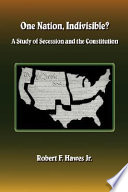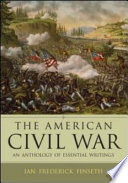 | Mel Friedman, Lina Miceli, Robert Bell, Michael Lee, Sally Wood, Adel Arshaghi, Suzanne Coffield, Michael McIrvin, Anita Price Davis, Research & Education Association, George DeLuca, Joseph Fili, Marilyn Gilbert, Bernice E. Goldberg, Leonard Kenner - Study Aids - 2005 - 886 pages
...all the States." 19. (B) Although both men espoused the rights of the states, Lincoln stated, "... no State upon its own mere motion can lawfully get out of the Union; . . . resolves and ordinances to that effect are legally void, and . . . acts . . . against the authority... | |
 | Bijian Zheng - Political Science - 2006 - 102 pages
...1861, when he explicitly said, "In view of the Constitution and the laws, the Union is unbroken. . . . No State upon its own mere motion can lawfully get out of the Union." I also quoted from his famous letter written in August 1862, where he further stressed: My paramount... | |
 | Michael Burgan - History - 2005 - 52 pages
...first public speech as president, Lincoln argued that the South could not legally secede. He said, "No state upon its own mere motion can lawfully get out of the Union." Lincoln saw the Confederates as rebels. He believed the US Constitution gave him the right to end any... | |
 | John W. Burgess - History - 2005 - 353 pages
...perfectly sound and true premise, he drew the conclusion that " no State upon its own mere motion " conld " lawfully get out of the "Union ; that resolves and ordinances to that effect " were " legally Toid ; and that acts of violence, within any State or States, against the authority... | |
 | Robert F. Hawes - Political Science - 2006 - 357 pages
...the Union is less perfect than before the Constitution, having lost the vital element of perpetuity. It follows from these views that no State, upon its...view of the Constitution and the laws, the Union is unbroken; and, to the extent of my ability, I shall take care, as the Constitution itself expressly... | |
 | Joseph Hartwell Barrett - Biography & Autobiography - 2006 - 896 pages
...possible, the Union is less than before, the Constitution having lost the vital element of perpetuity. It follows from these views that no State, upon its...view of the Constitution and the laws, the Union is unbroken, and, to the extent of my ability, I shall take care, as the Constitution itaelf expressly... | |
 | Ian Frederick Finseth - History - 2006 - 648 pages
...the Union is less perfect than before the Constitution, having lost the vital element of perpetuity. It follows from these views that no State, upon its...view of the Constitution and the laws, the Union is unbroken; and, to the extent of my ability, I shall take care, as the Constitution itself expressly... | |
 | William D. Pederson, Thomas T. Samaras, Frank J. Williams - Biometry - 2007 - 216 pages
...destruction. No state can voluntarily secede from the Union. Legislative acts allowing for secession "are "legally void, and that acts of violence within...insurrectionary or revolutionary, according to circumstances." 13 Lincoln called the whole idea of secession "anarchy." The rule of the majority adheres to "constitutional... | |
 | Richard Striner - History - 2006 - 320 pages
...proclaimed in the Articles of Confederation carried over to the Federal sequel. So it follows, he continued, "that no State, upon its own mere motion, can lawfully...resolves and ordinances to that effect are legally void."90 He called secession "the essence of anarchy," contending that majority rule, with appropriate... | |
 | Norman Schofield - Political Science - 2006 - 3 pages
...declared objects for ordaining and establishing the Constitution, was "to form a more perfect union"... It follows from these views that no State, upon its own mere motion, can lawfully get out of the Union,—that resolves and ordinances to that effect are legally void; and that acts of violence, within... | |
| |